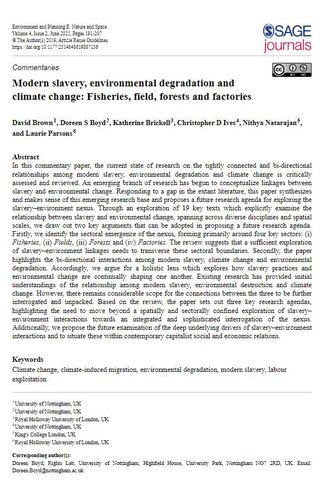Modern slavery, Environmental Degradation and Climate Change: Fisheries, Field, Forests and Factories (Cambodia))
2019
- Author
- Brown D, Boyd D S, Brickell K, Ives C D, Natarajan N & Parsons L
- World region
- East Asia and Pacific
- Origin of migration
- Cambodia
- Area of transit
- No data available
- Destination of migration
- Thailand
- Who is affected
- Agricultural communities
- Type of climatic event
-
Rapid-onset event, Slow-onset event
Cambodia is experiencing changing rainfall patterns, growing unpredictability of floods and droughts, and increasing short-term environmental shocks.
- Type of migration/mobility
-
Cross-border
Climate change is driving farming communities in Cambodia to migrate in search of alternative livelihoods. Migration to Thailand has increased in recent years.
- Destination industry or sector
-
Fisheries and factories
- Type of modern slavery
-
Debt bondage, Forced labour
The effects of climate change put pressure on agriculture communities in Cambodia to migrate in search of alternative livelihoods. This can lead to modern slavery, such as in the form of debt bondage on Thai fishing vessels.
- Link between climate change, migration and modern slavery
- Indirect
- Key vulnerability factors
-
Some people are more vulnerable to modern slavery because they are marginalised, because they lack alternatives to unsafe migration and because their communities find it extremely difficult to adapt to climate change, due to a lack of resources or support).
- Summary
-
This source focuses on the links between modern slavery and environmental change in fisheries, fields, forests and factories specifically. The authors recognise the role of capitalism in fuelling environmental degradation, climate change and exploitative business practices (e.g. logging/deforestation or brick kilns), which exacerbate modern slavery. They advocate for a more interconnected analysis of the issues to further our understanding of the links between environmental change and modern slavery.
- Recommendations
-
This report identifies a series of gaps in the research. For instance, more research is needed on: the cyclical relationship between environmental degradation, climate change and labour exploitation in the fishing sector in different locations; the risk of modern slavery in immobile agrarian communities in rural areas; the links between climate-induced environmental degradation in Cambodia and the prevalence of debt-bonded labour in Thai fisheries; and the links between climate-induced migration and modern slavery in brick kilns in South Asia, as well as other manufacturing sectors.



